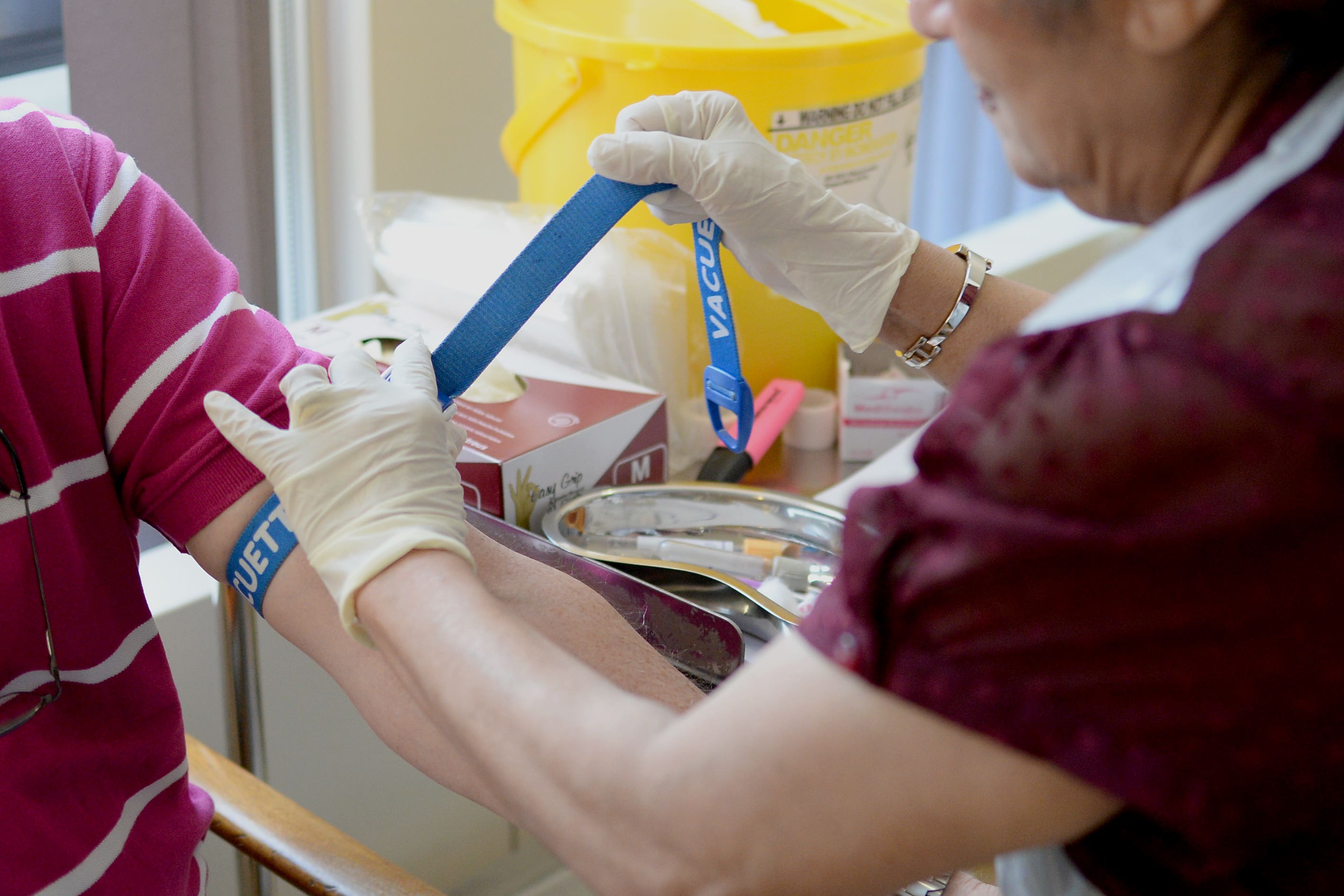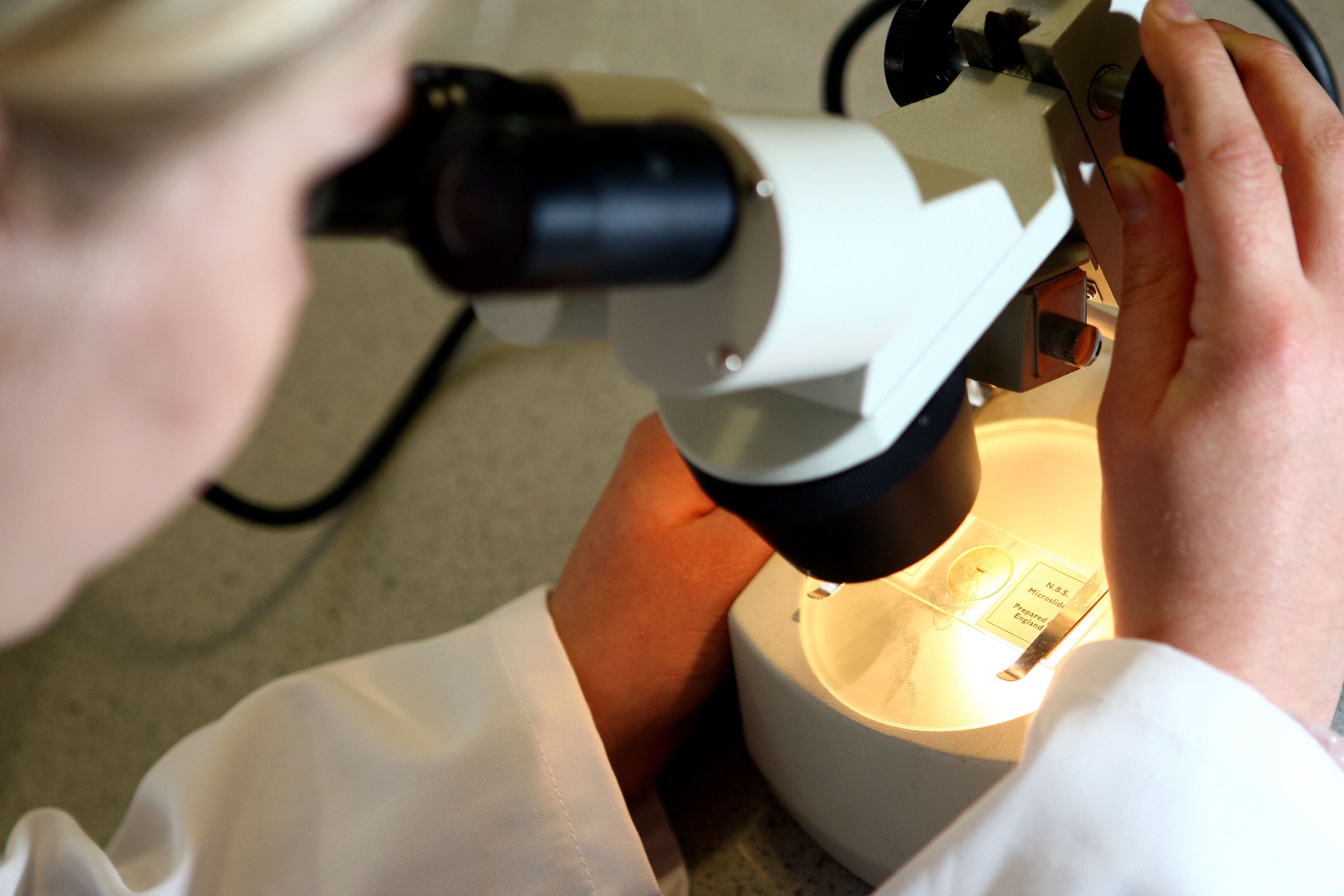Why we’re entering a new era of super tests for male cancers
As many men delay seeing a doctor out of embarrassment, a number of non-invasive tests for prostate and testicular cancer are on the horizon that are even more accurate in detecting the disease in younger and older men. Leah Hardy reports

In 2024, Olympic cyclist Sir Chris Hoy shocked the world when he revealed his diagnosis of stage four prostate cancer. At just 48 years old – and despite being one of the fittest men in the world – he was given only a few years to live after the disease was found to have progressed and spread throughout his body. Prostate cancer is now the most common cancer in the UK, and 12,000 men die of it every year. That’s 33 men every day.
Caught early, prostate cancer is highly treatable. So why are so many men still dying from it? Detection is the first hurdle: before being given his terminal stage four diagnosis, Hoy had noticed a pain in his shoulder and ribs that he mistakenly attributed to gym workouts. A scan revealed a tumour, and several hospital appointments and scans later showed that it had spread to his bones. “I’d had zero symptoms, nothing to point me towards that that might be an issue,” he told the BBC. “We were given the news that this was incurable.”
Currently, there is a lack of a reliable, accurate screening test for prostate cancer. The traditional PSA blood test, which looks for elevated levels of prostate-specific antigens, flags up a huge number of slow-growing cancers that are unlikely to cause harm, while missing some of the most aggressive types.
Prostate cancer is incredibly common, but also incredibly diverse in how it affects people. Half of men who reach 80 have cancer in their prostate. But in nearly all cases, says Alastair Lamb, a leading researcher into prostate cancer, those cancers would continue to remain asymptomatic and pose no threat to health. He says, “Maybe only 3 per cent of men will die from their prostate cancer. That’s very serious, and it’s still a lot of men, but it’s not 50 per cent.” The problem, he says, is that we “diagnose far too much prostate cancer” but fail to identify the 3 per cent of aggressive cancers that will, as in Hoy’s case, then spread and become deadly.
But what’s the problem if we, say, screen every man over 40 and, if they have cancer in their prostate, offer them treatment just in case? The issue is that current treatments – surgery, hormone therapy and radiotherapy – all carry risks. Surgery alone can have side effects including lifelong incontinence and sexual dysfunction. A price worth paying to save your life, maybe, but not if the cancer was never going to spread.
Men with high PSA scores often undergo stressful, invasive, and costly follow-ups, yet 80 per cent turn out not to have cancer at all. Lamb, also a, clinician scientist at the Barts Cancer Institute, Queen Mary University of London, says, “People think all we need to do is create a test, find every case of the disease and treat the disease. But this emphatically does not work in prostate cancer.”
This is why researchers are desperate to find a better test than is currently on offer, and this month the news came that one might be on the way. It comes in the form of a simple at-home spit test aimed at identifying men with a high genetic risk of developing prostate cancer.
Early studies suggest it could detect over 12,000 tumours at an earlier stage. The test was created by a group of international scientists based at the Institute of Cancer Research (ICR) in London. Simply by looking at a small sample of saliva, it can identify more than 160 genetic variants linked to prostate cancer and then use AI to calculate an individual’s risk of the disease.

In trials, the saliva test picked up more cancers than the current PSA, identified more aggressive cancers and returned fewer false positives. Of high-risk men sent for an MRI and biopsy, 40 per cent were subsequently diagnosed with prostate cancer, compared to just 25 per cent of those flagged by a high PSA level. Remarkably, it even identified cancers missed on MRI scans.
Professor Ros Eeles from the Institute of Cancer Research describes the test as “relatively simple” and “inexpensive”, saying it could help “turn the tide on prostate cancer.” And by catching cancer earlier and slashing the number of men sent for ultimately negative tests, it could also, she says, “save the NHS a significant amount of money.” The estimated savings? A staggering £500m a year.
The test isn’t ready for an NHS rollout yet. Initial trials only included European men, despite men of African heritage being twice as likely to develop prostate cancer and more than twice as likely to die of it. This is likely due to genetic differences. However, the test has since been updated to include genetic variants affecting African and Asian men, and further trials are underway. Men with high scores are now being monitored to see if they develop the disease – similar to the way women with the BRCA gene (brought into the spotlight by Angelina Jolie) are eligible for more frequent breast screenings.
Meanwhile, the charity Prostate Cancer UK is launching a £42m research programme involving hundreds of thousands of men. The TRANSFORM trial will pit different tests against each other – including genetic tests – to identify the most effective way to screen men for prostate cancer. The study will take at least three years to produce initial data.

Lamb’s own research, funded by Cancer Research UK, doesn’t look at our DNA, but at the genetic makeup of prostate cancer tumours themselves, trying to distinguish between cancers that could be deadly and those that will remain harmless. This work, he hopes, will eventually lead to tests which can spot these aggressive cancer cells via MRI or, because tumour cells leak into the bloodstream, through a simple blood test.
Meanwhile, biotech entrepreneur and scientist professor Sir Chris Evans has announced the development of two other tests, one for prostate cancer and another for testicular cancer. As founder and chief scientific officer of EDX Medical, a company specialising in cancer diagnostics and prevention, Evans has created what he calls a “highly accurate super test” for prostate cancer. He claims that, with the help of sophisticated AI algorithms, his blood test can detect the presence of cancerous cells, identify early and late-stage cancer, determine whether it’s slow-growing or aggressive, assess genetic and hereditary risk and guide treatment.
Men will ignore symptoms like bloating, blood in the urine or stool, or unexplained weight loss, regarding them as a weakness or a failure
“The increased accuracy over PSA testing should reduce the need for unnecessary MRIs,” says Evans. “The requirement for highly invasive digital rectal exams will also be dramatically reduced.”
The test has been patented and is in further trials, with its launch planned for later this year or in early 2026. Although it comes too late for his diagnosis, Hoy says of EDX’s prostate test: “I now know there is a need for better and more accurate prostate cancer screening tests – and I wholeheartedly welcome this initiative.”
But before this are Evans’s plans to release a blood test for testicular cancer, which is claimed to be 99 per cent accurate. Though relatively rare, testicular cancer affects around 2,400 men annually in the UK. It is one of the most curable cancers, with a survival rate of 95 per cent. But it can be devastating due to its impact on younger men. It is most common in men aged 15 to 45 – such as Coronation Street actor Jack James Ryan, who was diagnosed at 19 – and in some cases can affect fertility.
“There’s still such a huge stigma around testicular cancer, especially the process of getting physically checked,” Ryan says. “A simple blood test would remove the awkwardness and discomfort.”

Evans says the test is 99 per cent accurate, adding: “Accuracy is what matters. So people can get on with treatment or simply chill if all is well.” He says that many men delay seeing a doctor about male cancers out of embarrassment, even when they experience symptoms of prostate or testicular cancer.
“Men don’t want to self-examine, and even if they notice a lump, they might dismiss it as a sports injury. They’ll ignore symptoms like bloating, blood in the urine or stool, or unexplained weight loss, regarding them as a weakness or a failure. They feel embarrassed to talk about them, especially with a female GP. And the idea of the ‘finger up the bum’ test scares the life out of them.”
EDX’s new testicular cancer test will launch within weeks. The downside? It will only be available through private clinics. And while pricing hasn’t been finalised, Evans says it will cost “in the hundreds of pounds”. He says, “I believe the cure for cancer will come from testing to find the disease early, plus treatment with precision drugs, which are designed to attack the thing you’ve got with minimal side-effects. In the future, I can see people going back to work after two weeks of treatment, with no chemo, no hair loss, no toxicity, no radiology burns and no scars. But to achieve that, we need to find the right cancers very early. I believe new tests will help to make that happen.”



Join our commenting forum
Join thought-provoking conversations, follow other Independent readers and see their replies
Comments